 Petzlover
Petzlover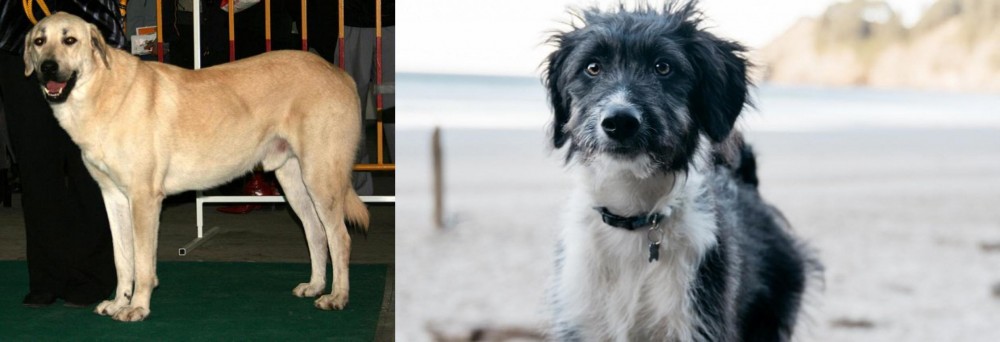 Central Anatolian Shepherd is originated from Turkey but Bordoodle is originated from United States. Central Anatolian Shepherd may grow 21 cm / 9 inches higher than Bordoodle. Central Anatolian Shepherd may weigh 43 kg / 95 pounds more than Bordoodle. Both Central Anatolian Shepherd and Bordoodle has almost same life span. Central Anatolian Shepherd may have more litter size than Bordoodle. Central Anatolian Shepherd requires Moderate Maintenance. But Bordoodle requires Low Maintenance
Central Anatolian Shepherd is originated from Turkey but Bordoodle is originated from United States. Central Anatolian Shepherd may grow 21 cm / 9 inches higher than Bordoodle. Central Anatolian Shepherd may weigh 43 kg / 95 pounds more than Bordoodle. Both Central Anatolian Shepherd and Bordoodle has almost same life span. Central Anatolian Shepherd may have more litter size than Bordoodle. Central Anatolian Shepherd requires Moderate Maintenance. But Bordoodle requires Low Maintenance
 The Central Anatolian Shepherd’s lineage is ancient, with the large dog originating from the Anatolia region of central Turkey. He has been used for guarding flocks against predatory wolves and has adapted to living in extreme weather conditions.
The Central Anatolian Shepherd’s lineage is ancient, with the large dog originating from the Anatolia region of central Turkey. He has been used for guarding flocks against predatory wolves and has adapted to living in extreme weather conditions.
The Turkish shepherds would put a spiked collar on the dog to protect him against predators going for the neck of the dog. Today the dog is still being used as a sheep dog and it is closely related to the Kangal Dog.
In 1965 the first pair of Anatolian Shepherds arrived in the UK. A pair were also provided by the Turkish prime minister to the United States government. Today he is a majestic dog still serving man. He is an Anatolian Shepherd Dog, a working dog breed, recognized by the American Kennel Club.
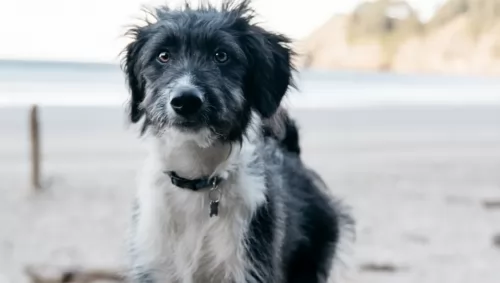 Known also as a Borderpoo or Borderdoodle, the Bordoodle is a designer- or hybrid breed which hails from the United States of America.
Known also as a Borderpoo or Borderdoodle, the Bordoodle is a designer- or hybrid breed which hails from the United States of America.
Both the dogs used in the development of this cross-breed are the Poodle and the Border Collie, and both these dog breeds have their own lengthy histories.
The history of the Bordoodle is short, as it is a modern crossbreed which has been purposefully bred by breeders to bring about a dog with certain looks and temperament.
 The Central Anatolian Shepherd is a large,impressive looking dog that possesses great strength, endurance and agility. He is beautiful to look at and is well muscled and strong.
The Central Anatolian Shepherd is a large,impressive looking dog that possesses great strength, endurance and agility. He is beautiful to look at and is well muscled and strong.
He stands at roughly 66-76 cm and weighs 40 to 70kg. The head is large and strong, but in good proportion with the rest of the dog’s body. He has brown eyes and his ears are floppy. The tail is long and set high and when the dog is alert, the tail is carried high, making a wheel shape, otherwise the tail is held low, curling up at the tip.
The short to medium length coarse coat is essentially fawn colored and the dog has a black mask. With the dog, early training and socialization will be needed as he is a strong, stubborn, dominant breed who will require firm leadership from his human owners.
The Central Anatolian Shepherd Dog is a loyal guard dog that becomes possessive over his flock, his human family and anything that he regards as his property. He is aloof around strangers, being suspicious of them.
He will require a firm, positive owner who provides training and socialization. He is an affectionate family pet and gets on well with children who have been taught how to treat dogs and other animals with care and respect. This is a bold, confident dog without aggression who is intelligent, proud and independent.
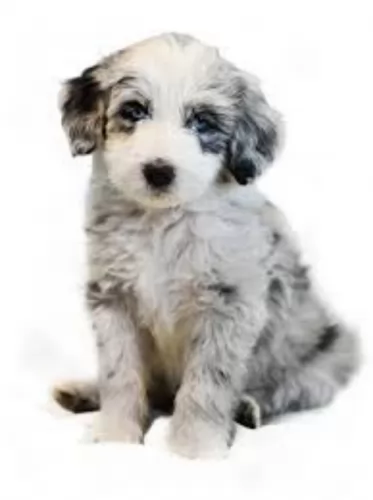 The Bordoodle isn’t a purebred dog but is a cross between a Poodle and a Border Collie.
The Bordoodle isn’t a purebred dog but is a cross between a Poodle and a Border Collie.
He has a soft, medium length coat which is inclined to be wavy. Colors are essentially black and white but chocolate, cream, fawn, merle and grey are also seen.
He is a medium sized dog standing at between 38cm and 55cm and weighing between 13kg and 27kg. The long tail is feathery, the ears floppy or semi-erect and the brown eyes are bright and intelligent. The muzzle is medium to long.
As with any mixed breed dog, the Bordoodle can take after either parent dog but generally the Borderdoodle will be a medium sized dog.
With the Bordoodle you can expect nothing less than a highly intelligent dog. That is because both the Poodle and the Border Collie are super intelligent dogs so the Bordoodle is guaranteed to have got a good portion of this intelligence from both breeds.
It makes training and socialization easy for the dog. It is important for your Bordoodle to be trained and socialized if you want him to be obedient and relaxed around strangers and other pets. As it is, his amicable nature makes the hybrid dog of yours a great family pet – getting on well with other pets in the home as well as with children.
Apart from being such a smart dog, the Bordoodle is active, playful, loving and devoted – everything a serious dog owner wants in a pet. This is a dog that doesn’t really know the meaning of the word aggressive.
 The large, rugged Anatolian Shepherd is a dog that has been developed essentially to work as a guardian of livestock. He is a dignified, calm kind of dog who is fiercely possessive of those he guards. He is independent and will require a firm, assertive owner.
The large, rugged Anatolian Shepherd is a dog that has been developed essentially to work as a guardian of livestock. He is a dignified, calm kind of dog who is fiercely possessive of those he guards. He is independent and will require a firm, assertive owner.
He won’t enjoy lying around the home with nothing to do. These are dogs who like to be busy, and therefore he is more a country-life dog than being found in the city on a small property. Make sure that if your pet hasn’t got a working role, that he is provided with exercise, although as a large dog, he isn’t particularly playful and doesn’t require loads of exercise.
Provide him with a caring, loving home and this large, beautiful dog will become your loyal and devoted friend who will guard you with his life.
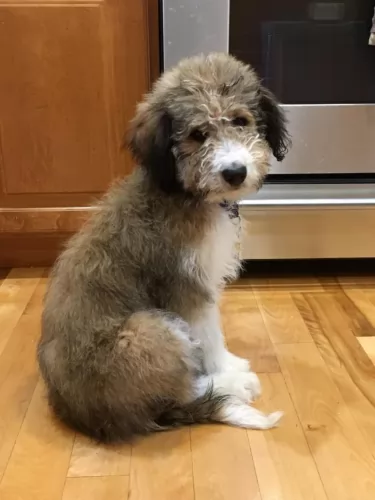 Bordoodles have two great dog breeds to thank for the way they turn out. When you think of the Border Collie and Poodle, you know you’re going to get a dog that is friendly, social, playful, loving and devoted – the ideal family pet.
Bordoodles have two great dog breeds to thank for the way they turn out. When you think of the Border Collie and Poodle, you know you’re going to get a dog that is friendly, social, playful, loving and devoted – the ideal family pet.
Intelligent, he is easy to train too, and with excellent care, you’re going to have a most wonderful family pet and companion, full of fun and life.
 The Anatolian Shepherd Dog is a hardy, healthy dog who isn’t likely to get sick easily. The dog can live to be 11, 12, 13 years of age when he receives excellent care. Like any pure breed though, he is susceptible to hereditary disorders and some of the other common health issues.
The Anatolian Shepherd Dog is a hardy, healthy dog who isn’t likely to get sick easily. The dog can live to be 11, 12, 13 years of age when he receives excellent care. Like any pure breed though, he is susceptible to hereditary disorders and some of the other common health issues.
This condition is always a problem with a big dog. It’s an abnormal development of the hip joint and it can cause lameness and painful arthritis of the joints. It is brought about by a combination of environmental- as well as genetic factors.
This is a common type of blood cell cancer diagnosed in dogs. Lymphoid tissue is present in quite a few places in the body including lymph nodes, liver and spleen, and dogs of any age can be affected.
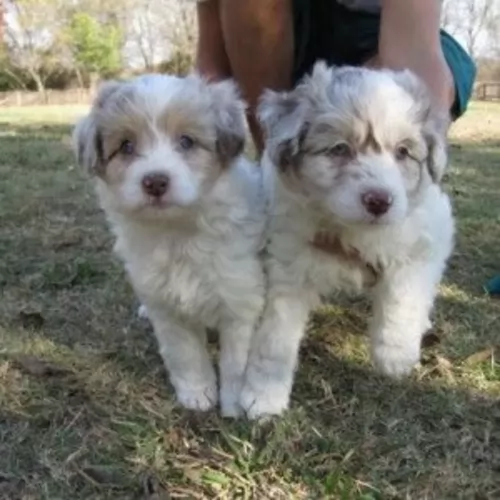 Bordoodles, when well cared for, can live to be 12-15 years of age. There aren’t going to be many health issues to contend with with your Bordoodle as there are no known health problems in this robust breed.
Bordoodles, when well cared for, can live to be 12-15 years of age. There aren’t going to be many health issues to contend with with your Bordoodle as there are no known health problems in this robust breed.
Nonetheless there are some common dog illnesses that you need to be aware of such as progressive retinal atrophy, hip dysplasia and hypothyroidism.
With hypothyroidism, the thyroid gland in the neck of your pet produces a hormone known as thyroxine that controls metabolism, but the disease hypothyroidism makes it that the gland doesn’t make enough thyroxine. Signs that your dog has this illness includes a dull coat, inflamed skin and even hair loss.
Get him to the vet immediately who will do blood tests and provide treatment. Mercifully it isn’t something that is life-threatening.
 The Central Anatolian Shepherd sheds fairly heavily so he will require brushing at least twice a week. Grooming is important and won’t only include brushing, but ear cleaning and nail trimming too as well as proper dental hygiene.
The Central Anatolian Shepherd sheds fairly heavily so he will require brushing at least twice a week. Grooming is important and won’t only include brushing, but ear cleaning and nail trimming too as well as proper dental hygiene.
A dog such as the Anatolian Shepherd, with his floppy ears, will also need to have his ears checked and cleaned to avoid ear infections. There are some of these dogs where the hair needs to be plucked from the ear canal to ensure proper air circulation.
It is important that you are skilled to clean the ears properly, and if in any doubt, to avoid damage to the ear, consult your vet for sound advice.
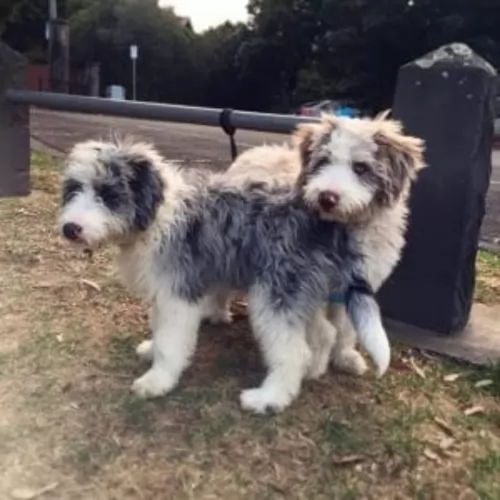 The Bordoodle is a dog which doesn’t shed that much so his grooming requirements are low and he is considered as a hypoallergenic dog.
The Bordoodle is a dog which doesn’t shed that much so his grooming requirements are low and he is considered as a hypoallergenic dog.
He will need to have his coat brushed at least twice a week to keep it shiny, soft and smooth. Depending on how your Bordoodle turns out, he may even require trimming at a professional groomer.
Make time to check his ears inside and out and learn how to clean the inside of his ears to avoid infection and wax build-up.
Dental hygiene is also imperative in dogs, and neglecting to do this will mean food particles and bacteria accumulating along your pet’s gumline, resulting in gingivitis and periodontal disease.
Every dog will require regular exercise and you can get your Bordoodle to join you in your walks. He is the kind of dog that can happily adjust to city or country life, but he will still need to have some ball games and other activities to keep him busy and happy.
He isn’t a dog that can be left alone day after day in the backyard. He is social and playful and loves the companionship of his human family.
If you feed your Bordoodle kibble from some of the top quality commercially produced foods, always research the dog food and take a good look at the ingredients.
The pet food you choose plays an important role in the longevity of your pet. There are commercially manufactured foods that have such poor ingredients that they can actually shorten your pet’s lifespan and cause stress to the kidneys and liver.
If in any doubt about what to feed your Bordoodle, speak to your vet. Cooked brown rice, cooked vegetables and cooked chicken can sometimes be mixed into your pet’s kibble. Raw meat should also occasionally be added in to ward off skin allergies.